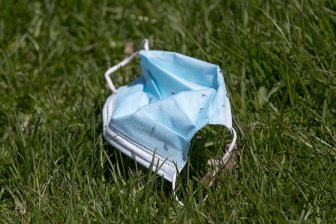[ad_1]
While the world continues to grapple with the COVID-19 pandemic, another deadly virus has popped up in one of Alberta’s animal populations.
Rabbit owners and veterinarians are expressing concern after a case of rabbit hemorrhagic disease (RHDV2) was identified in Lethbridge in late April.
A letter from Alberta’s chief provincial veterinarian explains “RHDV2 has been confirmed in pet rabbits in one household in southern Alberta.”
The disease is easily transmissible and highly contagious, and has a high mortality rate. Death is common after a short period of illness, and sudden death may occur without any symptoms.
Read more:
Virus that kills rabbits faster than Ebola affects some humans reappears on Vancouver Island
According to the Calgary Avian & Exotic Pet Clinic, five domestic rabbits died in Lethbridge after becoming infected.
“Sadly, five indoor rabbits passed away due to the RHD virus roughly a day-and-a-half after a new rabbit was added to the group,” its Facebook post read. “This underscores the need for strict quarantine of any new pets added to the home.”
Located in Lethbridge, Archie’s Angels Rabbit Rescue is currently caring for around 50 rabbits and is very worried about RHDV2.
“This disease is very scary. It’s very, very transmissible,” director Alyssa Konig explained. “You can bring it in on your shoes, clothes, objects.”
The introduction of the virus to the community was enough for the rescue to close up shop for the time being.
“We’ve actually completely shut down our rescue,” she said. “And we’re not the only ones.
“Nobody comes in, nobody comes out, no transporting rabbits. Obviously, we have to be extremely diligent with our biosecurity.”
Konig added the other concern is the lack of vaccines in the area.
“There is no vaccine licensed for general use in Canada,” the letter from the chief provincial veterinarian read. “(However), veterinarians are able to apply to the Canadian Food Inspection Agency for an Emergency and Research Use Import Permit to import vaccine in certain special circumstances.”
One of Karli Pansky’s pet rabbits.
Courtesy: Karli Pansky
Karli Pansky, Lethbridge resident and owner of three rabbits, is hoping veterinarians will be able to acquire the vaccine to bring peace of mind to rabbit owners such as herself.
“I wasn’t too worried, considering there hadn’t been any cases in Alberta yet,” she said. “But then to find out there were cases right here, it’s crazy and really worrying.
“If a vaccine was here in Lethbridge, they’d be going as soon as possible.”
Dr. Adrian Walton, who owns the Dewdney Animal Hospital in Maple Ridge, B.C., said the disease popped up in the Vancouver area in 2018 and briefly reappeared in the area in 2019.
With a mortality rate of around 90 per cent, Walton said it petered out fairly quickly in Canada. But now, it’s back and seems to carry a lower mortality rate, meaning transmission is more likely. There is no cure for the disease, and rabbits who survive will be lifelong carriers.
“Everything went quiet, until 18 months ago,” he said. “All of a sudden, New Mexico had an outbreak, (and) this thing is travelling like wildfire throughout North America.”
With cases also confirmed in Montana, Walton added if the recent Lethbridge cases don’t cause spread, the chances of the disease further entering the province are high.
“The concern we have in this case is because we don’t know where it came from, and really, we know that the virus is just one state away, even if this is an isolated outbreak — since there is really nothing to stop the virus from moving northwards — that I suspect that it’s going to be a problem for Alberta in the coming months.”
Walton explained if wild rabbits become infected, the impact on the food chain could be detrimental.
“Please, if you do find a deceased rabbit that looks like it just died for no reason, just reach out to Fish and Wildlife and let them know so they can track how this is moving through Alberta,” Walton said.
© 2021 Global News, a division of Corus Entertainment Inc.
[ad_2]


